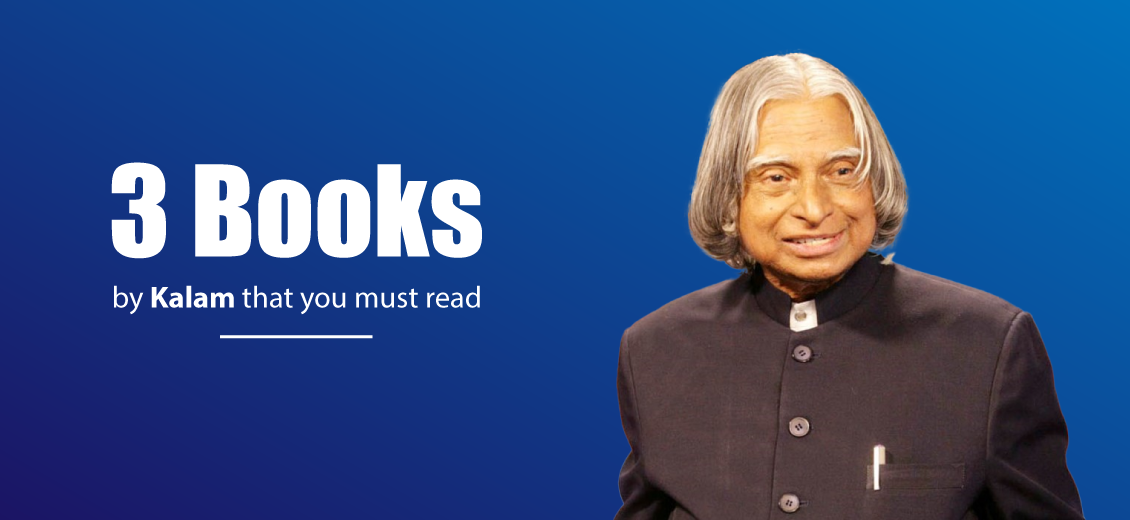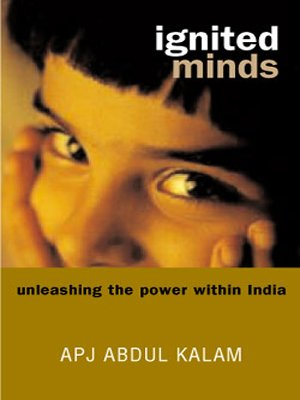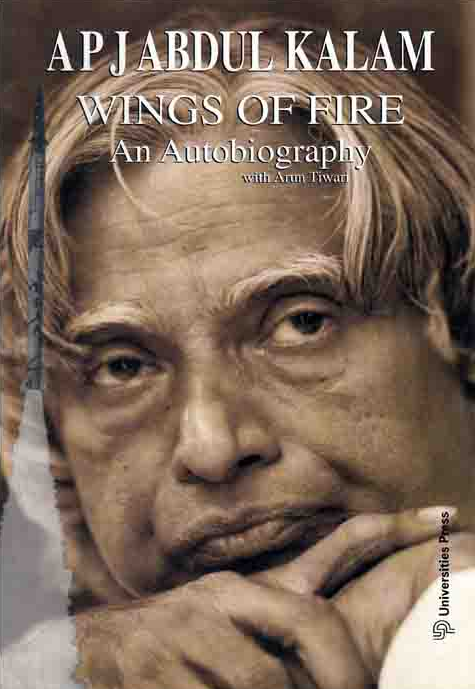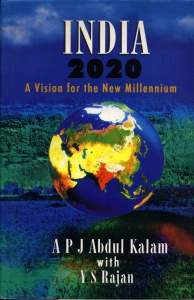Three Books By Kalam That You Must Read!
Blogs Home
- 15 Oct 2022

Born on 15 October 1931, a young boy who is famously referred to as the "Missile Man Of India" originated from the streets of Rameswaram in Tamil Nadu. Dr Avul Pakir Jainulabdeen Abdul Kalam or better known as APJ Abdul Kalam believed in dreams and acted upon them. He was a devoted student of aeronautics at MIT and a renowned scientist. In 2002, he got elected as the 11th President of India and served his term as the Head of the State till 2007.
Kalam had the energy to inspire others through his mere presence, and when he spoke, he filled everyone with a great zeal of enthusiasm and positivity. On his birth anniversary, and as we remember him, it would be best to read some of his many works.
Here are 3 books you should read by APJ Abdul Kalam
Ignited Minds
Ignited Minds addresses the young population of India. In his book, Dr Kalam tried to approach the minds of young Indians to ignite their psyche and lead India to the transformation it deserves. Kalam speaks to youngsters about transforming India in the Preface of his book. Through his simple words, he tries to nudge creative minds and steer their hearts. While the book raises a lot of questions that need to be discussed, it underlines mostly the peace of mind that is required for a nation to develop and reach heights.
He begins by recalling an incident of a helicopter crash in 2001 when he, along with his crew saw death very closely. Following it, he saw a dream that was strange but had something important to show. He dreamt about five people, namely, Gandhi, Einstein, Ashoka, Lincoln and Caliph Omar. Kalam tells us that this dream allowed him to be aware of reality. All of these characters had something in common- they inspired generations to come. Kalam argued that it was important to merge education with spirituality. While he did not consider the zeal for material yearnings to be wrong, he emphasised that one should integrate spirituality with the outer world.
The wealth of our nation is not in its resource-rich areas alone, it lies majorly in the fact that India can and should develop a generation that is smart and reasonable. India survived years of colonial rule, and gained Independence after a long struggle, beginning in 1857. Without a doubt, the effects of Imperialism stunted India's growth. It struggles with the economy and has a large population living under the poverty line to date. Despite this, it resisted colonial rule, and manage to preserve itself. Indian youth has to fulfil since they can rebuild what has been taken away, and for this Kalam advises them to take the help of technology and draw inspiration from its past of ancient wisdom and knowledge.
India has been a peaceful nation and Kalam tells us it is not because it lacks the capacity to attack, but because India is a nation of tolerant people. However, he warns us that this has been used against us for many years. He is aware of the International system and warns us that without a strong defence, India would fail to be a key player in International events. When surrounded by hostile neighbours, and that is the case with India, it is important to cultivate a defence that is strong and capable.
Kalam had the opportunity to interact with different people from different religions and he concluded that each of them had emphasised the same thing i.e spiritual well-being. The ill fate of our nation is not the multiple religions practised on Indian soil but the people who seek divisions. It weakens us as a nation, and we become vulnerable to conflicts. The youth must know the threat of such differences and learn to negotiate their viewpoints. Ignited minds is a must-read book for those who wish to know the way Kalam thinks and especially for young minds who can find inspiration in the simplicity of Kalam's words.
Wings of Fire
Wings of Fire is an autobiographical account of Mr Kalam jointly written with Arun Tiwari. The bestseller autobiography allows the reader to dive into the minute details of his life, the hardships he faced as a young boy, the humble background of his family, the cruelty of adversaries he faced, the lessons he gained from his experiences, but most importantly, it will give a glimpse of his positive attitude towards life.
The book fills us with the details of his life before he became President of India. What led to his interest in space and research, who were the people that deeply impacted Kalam and shaped his journey before he became the renowned scientist we know him today, and what life looked like for a young boy before he became the President. The initial chapters draw a vivid picture of his former years as a young boy in a small village in Tamil Nadu.
Born on the small island of Rameswaram in Tamil Nadu, in what one can say is a normal middle-class family, the young boy Kalam dared to dream big and follow it by action. His experiences at Langley Research Centre, NASA, and Wallops Flight Facility tell a lot about his dedication and commitment to keep going. It also does not miss to tell us about personal losses he had to deal with, one of which is especially his father's death.
His narration is so simple and yet so moving, that one should not miss this one. While Wings of Fire can be seen as a success story, it does not miss the failures that he had to deal with, and how he overcame them. And if one sees it right, that is what life is, failures and successes.
Reading an autobiography is always a good idea. It informs you that successful people are not made overnight. It inspires you to keep going. It reinforces the same strategy one needs to be successful. Wings of Fire is a must-read book because it does all of it with utmost honesty and sincerity.
"Dreams are not those that we see in our sleep, they should be the ones that never let us sleep" is one of the most quoted lines of Kalam from his autobiography. His other autobiography "My Journey: Transforming Dreams Into Actions" is another book that one can read. It is an updated autobiography and covers a lot of details about his life, his loss, his youth, his failure and his successes. One thing that is common among both these books is his positive thinking and how he moved forward despite all odds! If you haven't already read him, it is a good idea to start with his autobiography.
India 2020
Dr Kalam and Dr Y.S. Rajan, two of the most distinguished scientists of our nation have co-authored the book 'India 2020- A Vision for a New Millenium.' While the 19th century belonged to Europe, and the 20th to America, these two make a point that the 21st century belongs to India. The book is dissected into eight chapters, each chapter telling us about something of importance and something that can be of particular interest to its readers.
The introductory chapter draws an outline of India, known for its glorious past, landscapes, its unique location, its civilisation and diversity and asks the most obvious question- why has it not been a developed nation yet? Kalam's speech at Hyderabad outlines three visions he has for India. But most importantly, it answers the importance of a vision and how to strive towards one. The following chapter talks about Freedom. Beginning in 1857, India has fought for its freedom and since it knows its intrinsic value, it has never tried to conquer and capture the freedom of some other nation.
It also addresses the vision of development. For the past 15 years, India has been considered a developing nation. It's time to move forward, it is time to be a developed nation. India, as a nation is rising in its glory worldwide and yet we lack the self-confidence needed. Kalam envisions a nation where India has the largest economy, an upliftment in living standards, where technology can be used by the common man and is not for the rich classes alone. He underlines the role that technology can play a crucial role in development, like that in the case of Japan. His third vision is to see India stand for itself. The authors believe that until and unless India doesn't stand for itself in global affairs, no one else will recognise and respect it and that is the right opinion to hold.
Kalam is observant and he points out that the media is obsessed with news that is negative. He appeals to the media to showcase positive developments that can inspire the citizens. He also addresses the irony of citizens who are obsessed with foreign things. Kalam holds self-reliance as the key to achieving self-respect. He also discusses the routine of blaming everything on the system and pleads with the citizens to actively contribute to society.
The authors believe that Vision 2020 is achievable and that requires no doubts. For this, sensitisation to the issues surrounding us and a willingness to resolve them is needed. Kalam lists all the problems that surround us today and also offers possible solutions to them. He appeals to us to not hesitate from adopting what is relevant from other nations. Vision 2020 is a must-read book that appeals to all of us, as citizens of this country, and as Indians.
At 83, Kalam passed away while addressing an audience but left us with a legacy that continues to inspire millions of people across the world. His understanding of India, his vision of the Nation as a developed state, his love for the country, his message to the youth, his request to its citizens, and his positivity in face of hardships tell a lot about Mr Kalam. Youth is always in need of good role models, and Mr Kalam is one such ideal.

Annie Pruthi
Annie Pruthi is pursuing her masters in Pol. Science from JMI, New Delhi and is a 1st division Arts graduate from Gargi College, DU. She is an avid reader and an award-winning author.







